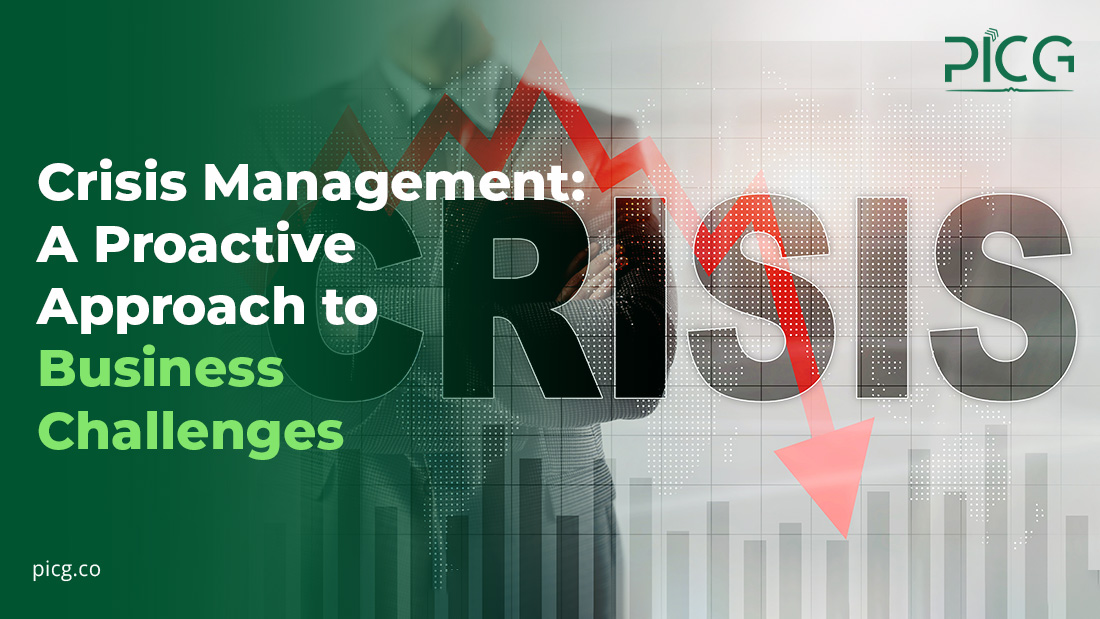


PICG

No matter if you have a MNC or a small scale local business, crises are inevitable. Whether it's a sudden economic downturn, a global pandemic, or unforeseen market shifts, businesses must be prepared to weather storms and emerge stronger.
This is where proactive crisis management comes into play—a strategic approach that can make the difference between survival and struggle.
Crisis management is not just about reacting when a problem arises; it's about anticipating and planning for potential issues before they escalate. A proactive approach involves identifying potential risks, developing strategies to mitigate them, and having a well-prepared crisis management team in place.
Begin by conducting a thorough risk assessment. What are the potential threats to your business? These could range from economic factors and supply chain disruptions to natural disasters and technological failures. By understanding the risks specific to your industry and business, you can better prepare for them.
Once potential risks are identified, the next step is to develop mitigation strategies. This involves putting measures in place to reduce the impact of potential crises. For instance, if your business relies heavily on a specific supplier, diversifying your supply chain can be a proactive strategy to mitigate the risk of disruptions.
Having a dedicated crisis management team is crucial. This team should include individuals from various departments, each bringing a unique skill set to the table. Their role is to implement the crisis management plan, make decisions swiftly, and communicate effectively both internally and externally.
Reacting to a crisis after it has unfolded can be costly—both financially and in terms of reputation. The economic impact of crises is evident; according to a survey by Deloitte, 60% of companies experienced a financial impact of $1 million or more due to a crisis. Moreover, the reputational damage can linger long after the crisis has passed, affecting customer trust and investor confidence.
A proactive approach to crisis management, on the other hand, allows businesses to minimize the financial impact and protect their reputation. It's an investment in resilience that pays off when the unexpected occurs.
Examining real-life examples illustrates the effectiveness of proactive crisis management. Take the case of a retail company that diversified its suppliers following a previous supply chain disruption. When a new crisis hit, they were able to navigate the challenges more smoothly, ensuring a continuous flow of products to meet customer demand.
Similarly, companies that had invested in robust digital infrastructure before the COVID-19 pandemic were better equipped to transition to remote work seamlessly. This proactive approach not only protected employee well-being but also ensured minimal disruption to business operations.
Proactive crisis management goes beyond having a plan on paper; it involves fostering a culture that values foresight and preparedness. Regular training and simulations can help employees understand their roles in crisis scenarios. Open communication channels within the organization also enable the swift dissemination of information during times of uncertainty.
Encouraging employees to voice concerns and ideas for risk mitigation can lead to valuable insights. After all, the collective knowledge and experience of the entire team contribute to a more comprehensive understanding of potential risks and effective strategies for mitigation.
As we move into 2024, businesses must recognize that crisis management is not a one-time task but an ongoing process. Regularly reassessing potential risks, updating mitigation strategies, and refining the crisis management plan are essential components of maintaining resilience in the face of evolving challenges.
Moreover, businesses should stay informed about external factors that could impact their industry and be ready to adapt swiftly. The ability to pivot in response to changing circumstances is a hallmark of proactive crisis management.
As we chart the course into the future, businesses that embrace a proactive culture of crisis management will find themselves not only weathering storms but emerging stronger, more resilient, and better prepared for whatever challenges lie ahead. The journey to proactive crisis management is an investment in the longevity and success of a business—a journey well worth taking.